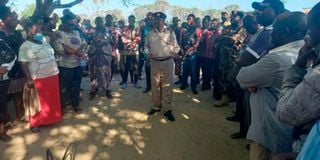Premium
Land disputes linked to Lamu violence

Lamu West Deputy County Commissioner, Charles Kitheka addresses Bobo village residents in Hindi ward on December 4, 2022. Security agents are pursuing a gang that abducted three wine tappers in Kibokoni.
What you need to know:
- Lawmaker urges locals to work with police and report any suspicious characters or activities.
- The Ministry of Interior imposes a dusk-to-dawn curfew for 30 days in areas it declares disturbed.
The recent deadly clashes in Lamu could be linked to terrorism, land disputes and politics, security agents and administrators now say.
Following the attacks, the government imposed a dusk-to-dawn curfew in several parts of the coastal county.
The government designated parts of Lamu a “disturbed zone” and deployed security contingent to end violence and track the gang that also abducted two men in Kibokoni.
Interior Cabinet Secretary Fred Matiang’i said 13 locations would be under curfew for 30 days following attacks in Widho that have seen houses torched and families flee.
“In accordance with Section 106 (1) of the National Police Service Act, 2011, the National Security Council (NSC) has declared the following parts...as disturbed and ordered a dusk-to-dawn curfew for 30 days, effective January 5,” the notice reads.
The affected areas are Majembeni, Ndamwe, Mkunumbi, Pandanguo, Binde Warinde, Witu and Hamasi. Others are Bomani, Pongwe, Mpeketoni, Bahari and Mapenya in Lamu West sub-county as well as Hindi in Lamu Central.
Though the attacks were initially blamed on al-Shabaab, Coast Regional Coordinator John Elungata said land and ethnic disputes could also have played a role.
“If someone is in your land and there is a problem, do not kill. Follow the right procedure,” Mr Elungata said when he visited the violence-scarred county.
He advised residents to work with security agencies and share information that could lead to the arrest of perpetrators of the violence.
Ten people arrested in connection with the killings appeared at a Mpeketoni court yesterday.
The 10 were, however, not charged with anything as police asked for 30 days to conclude the investigations.
“We still need more information from them. Police hope to conclude the investigations,” Lamu Police Commander Moses Mureithi was quoted as saying before the 10 were taken to court.
The NSC directed the immediate deployment of a multi-agency security team to the clash-torn areas. Six people were killed in Widho village, Mkunumbi ward, on Sunday night.
Residents said more than 30 heavily armed men raided the village around 10 pm.
A 62-year-old man was killed and set ablaze in Bobo Sunkia village, Lamu West sub-county, the following night.
The gang razed houses as it fled into Boni forest, where a military operation against al-Shabaab has been ongoing for years.
Security forces are looking for the two villagers taken by the armed men who are thought to be behind the killings.
Three wine tappers were abducted in Kibokoni on Tuesday around 5pm but one escaped and went to police.
The man who escaped from the abductors is helping police track his colleagues, Mr Mureithi said.
The men had gone to the forest in Kibokoni to tap traditional alcohol, locally known as mkoma, when they were taken by the armed group.
Lamu West MP Stanley Muthama urged the Ministry of Interior to come to the rescue of Widho and Bobo village residents.
“I ask the people of Lamu West to be vigilant and report suspicious activities or persons to relevant authorities,” the lawmaker said.






